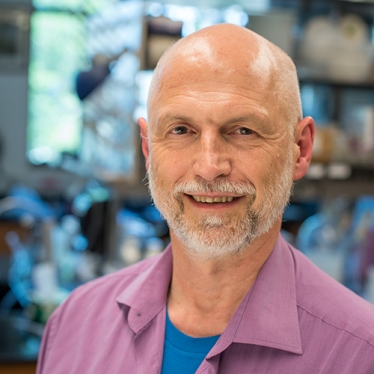David Bickar
Professor of Chemistry

Contact & Office Hours
Ford Hall 205B
413-585-3837
Education
Ph.D., Duke University
B.A., Reed College
Biography
David Bickar’s research has diverged into three distinct areas. The first focuses on the mechanisms of electron transfer and oxygen reduction, and the proteins that catalyze these reactions. Much of his study has been on the enzymes of the mitochondrial electron transport pathway.
The second area of research is to identify the mechanism by which a group of structurally similar compounds are selectively toxic to the neurons in one small region of the brain. The death of these neurons results in Parkinson’s disease, and exposure to these compounds can cause the onset of symptoms that are similar or identical to those of classical parkinsonism, except in young victims.
Bickar’s last area of study is the design and preparation of self-organizing chemical systems based on the ligand affinities and coordination properties of metal complexes. Such systems may provide information about key steps in the origin of life.
Selected Publications
*denotes Smith undergraduate co-author
*Tran, K-V., Bickar, D., "Dakin-West Synthesis of β-Aryl Ketones," The Journal of Organic Chemistry, 71, 6640-4443 (2006).
Hall, A., *Hoffmaster, R., Stern, E., Harrington, M., Bickar, D., "Suprachiasmatic Nucleus Neurons Are Glucose-Sensitive," Journal of Biological Rhythms, 12, 388-400 (1997).
Bickar, D., Reid, P., "A High-Affinity Protein Stain for Western Blots, Tissue Prints and Electrophoretic Gels," Analytical Biochemistry, 203, 109-115 (1992).
Wilson, M., Bickar, D., "Cytochrome Oxidase as a Proton Pump," Journal of Bioenergetics and Biomembranes, 23, 755-771 (1991).
*Kim, S. and Bickar, D., "Spontaneous Peptide Bond Formation Under Origin of Life Conditions," Biophysics Journal (Abst.) 57, 62 (1990).
Bickar, D., Turrens, J. and Lehninger, A., "The Mechanism by Which Oxygen and Cytochrome c Increase the Rate of Electron Transfer from Cytochrome a to Cytochrome a3 of Cytochrome Oxidase," The Journal of Biological Chemistry, 261, 14461-14466 (1986).
